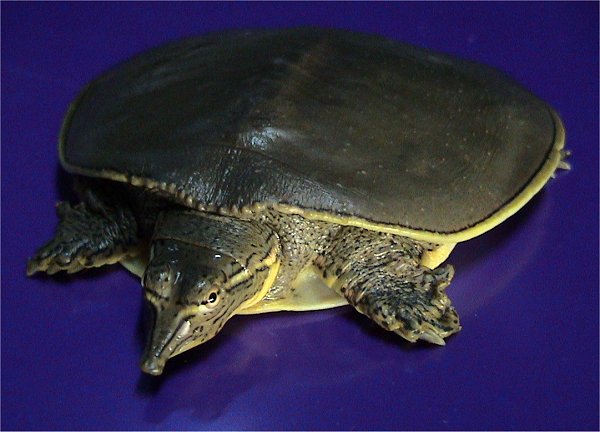| Place of Origin and Range |
This turtle has a wide range, extending throughout much of the United States, as well as north into the Canadian provinces of Ontario and Quebec, and south into the Mexican states of Tamaulipas, Nuevo León, Coahuila and Chihuahua. |
| Description |
The recognized subspecies differ in the markings on the carapace, on the sides of the head, and on the feet. However, these markings, which are distinct as hatchlings, fade as the turtles grow larger. The underside of the carapace is light in colour and does not contrast with the plastral colour. When viewed from above, the carapace is nearly round. Some have white spots, some have darks spots. |
| Morph Patterns Available |
Yes |
| Adult Size |
Can grow up to 15 in (37.5cm) |
| Accommodation |
A filtered aquarium with water temperature at 70-80'F(21-26'C), and a sloping ramp(driftwood, textured plastic or some other non-abrasive surface) leading from the bottom to an illuminated and warmed basking spot. Approx 80'F(27'C). |
| Lifespan |
Can live 25+ years |
| Feeding / Diet |
Snails, crayfish, minnows, worms,insects, and prepared foods such as pelleted trout, catfish pellets, and koi goldfish pellets. |
| Breeding |
Spiny Soft-Shells begin mating between ages 8 and 10. A large female turtle may live up to 50 years. The turtles mate in mid-to-late spring in deep water. The male will nudge the female's head while swimming, and if she chooses to mate, the male will swim above the female without clasping her with his claws (unlike other turtles). A few months later, the female turtle quickly lays her eggs along a sunny sandbar or gravel bank in a flask-shaped cavity she has dug close to the water. The turtle nests more than once during a single season. She can lay between 9 and 38 round, calcareous-shelled eggs. The eggs are laid around August and September, and they hatch in the spring. Unlike in other turtles, in the Spiny Soft-Shell turtle, the sex of the hatchlings is not determined by temperature variations; it is determined by genetics. |
| Other Considerations |
Watch for theses health concerns carefully with your turtle. Vitamin A Deficiency: Vitamin A is an important nutrient for your turtle’s health. It is found in his diet in the form of leafy green, orange or yellow vegetables, liver, and fish. If your turtle is not getting enough Vitamin A, he can suffer serious health problems. Always check to make sure that your turtle does not have swollen eyelids, as this is the main sign of a Vitamin A deficiency. Also, check for weight loss, nasal discharge and infected skin. Any of these symptoms could point to a deficiency. If you think your turtle may not be getting enough Vitamin A, you should take him to the veterinarian to get a firm diagnosis. Shell Problems: Your turtle’s shell is very important to his overall health. There are many potential problems that could occur, so you should be on the lookout at all times. Respiratory Disease: Respiratory infections have symptoms similar to vitamin A deficiency, including swollen eyelids and runny nose, so you should take your turtle to the veterinarian to get a proper diagnosis if you suspect either. More serious infections will be characterized by breathing through the mouth, mucus in the mouth, and wheezing. Always make sure your turtle’s environment has the proper amount of humidity, as this will help prevent respiratory problems. |




